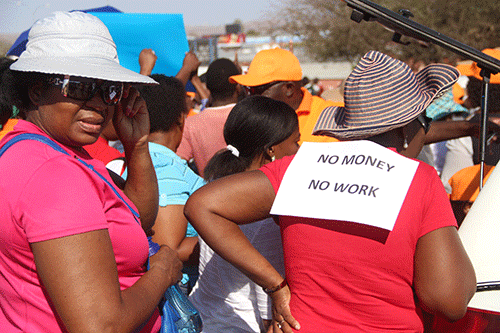More than 100 000 government employees are gearing up for what could amount to the biggest-ever strike since independence after government and the bargaining unions reached a deadlock and a certificate of unresolved dispute was issued.
This came after government reaffirmed its position that there was just not enough money for pay raises for public employees.
The country’s biggest civil service trade unions – the Namibia National Teachers Union (Nantu) and the Namibia Public Workers Union (Napwu) – said on Friday that votes on whether to begin a countrywide strike would be cast on Thursday and Friday, with results anticipated soon thereafter.
“We met on Thursday last week before a conciliator at the Office of the Labour Commissioner to discuss the logistics needed to manage the balloting process as well as the necessary human, material and financial resources,” a joint statement signed by government’s chief negotiator Ngidinua Daniel and the bargaining unions’ leaders Loide Shaanika and Petrus Nevonga reads. Shaanika is Nantu secretary-general, while Nevonga serves Napwu in the same capacity. Voter education will start today (Monday). If workers back strike action, the unions said, it could amount to the biggest-ever strike by its members since independence.
During the state of the nation address (SONA), President Hage Geingob did not hesitate to inform civil servants who had not received a pay raise in the last 10 years that there simply was no money.
No one, he claimed, is attempting to prevent employees from receiving the pay raises due to them.
Additionally, information minister Peya Mushelenga said last month in the National Assembly that “we understand the plight of civil servants, and that if resources were available and allow, the government, as it has done in the past years up to 2017/2018, would have agreed to all the demands from the unions,”
Daniel, Shaanika and Nevonga said in the statement that the decision to strike or not will be made through a balloting process, which will be jointly administered by the trade unions, and observed by government representatives.
“Realistic logistics were considered in order to have an honest and open voting process. It was consequently decided that the previously mentioned dates of 25 and 26 July are insufficient to allow for the completion of all logistical procedures,” reads the statement.
“As a result, parties agreed to new polling dates to be on the 28th and 29th July 2022, respectively,” the statement adds.
Workers’ unions representing the interests of civil servants had requested for a 10% increment across the board, a 25% increase to qualifying amounts on housing subsidies, a 9% increase on housing allowances, a 10% increase in transport for civil servants below management, and a N$7 per kilometre tariff increase.
Despite efforts by the unions to revise their initial proposals for a basic salary increase from 10% to 5%, government still didn’t consider it.
The only partial benefit government is willing to make an offer on is the housing allowance, where management and staff members below management cadre
would get a 4.5% increase.
The other benefit the government is also willing to offer is another 4.5% for the housing ownership scheme, and a 10% transport allowance increase for staff members below management level.
– ktjitemisa@nepc.com.na


